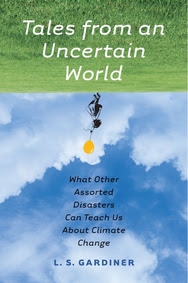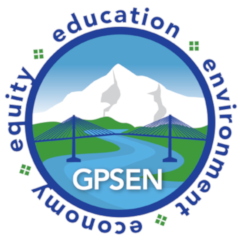Search by category:
Community Events | Classes + Workshops | Conferences | Jobs + Internships | Grants

- This event has passed.

Planet Stewards: Tales from Uncertain World
November 26, 2018 @ 5:00 pm - 6:00 pm
FreeTales from an Uncertain World: What Other Assorted Disasters Can Teach Us About Climate Change
This discussion will be led by the book’s author, Lisa Gardiner.
Space is limited, so register soon!
To join the discussion Dial (toll free) 866-662-7513. When prompted, use the pass code: 1170791#
Scroll down for a description of the book and to see the questions for the discussion.
So far, humanity hasn’t done very well in addressing the ongoing climate catastrophe. Veteran science educator L. S. Gardiner believes we can learn to do better by understanding how we’ve dealt with other types of environmental risks in the past and why we are dragging our feet in addressing this most urgent emergency. Weaving scientific facts and research together with humor and emotion, Gardiner explores human responses to erosion, earthquakes, fires, invasive species, marine degradation, volcanic eruptions, and floods in order to illuminate why we find it so challenging to deal with climate change. Insight emerges from unexpected places—a mermaid exhibit, a Magic 8 Ball, and midcentury cartoons about a future that never came to be.
Instead of focusing on the economics and geopolitics of the debate over climate change, this book brings large-scale disaster to a human scale, emphasizing the role of the individual. We humans dohave the capacity to deal with disasters. When we face threatening changes, we don’t just stand there pretending it isn’t so, we do something. But because we’re human, our responses aren’t always the right ones the first time—yet we can learn to do better. This book is essential reading for all who want to know how we can draw on our strengths to survive the climate catastrophe and forge a new relationship with nature.
“Given the advancing state of climatic disruption, humans are going to spend a lot of the foreseeable future dealing with disaster. This fascinating volume provides some memorable examples of how we’ve done so in the past, and as such helps concentrate our thinking on the necessary task of limiting the damage that’s coming our way.”—Bill McKibben
“Gardiner’s lively and fresh observations detail the actions necessary to head off the impending disaster of climate change, showing why forward movement has been so sluggish… Fresh insights about scientific literacy and generational shifts from techno-optimism to dystopian views of the future also cover new ground. Gardiner is not an alarmist. While relaying concern that international, governmental, and corporate actors need to do more—and quickly!—to prevent catastrophic climate change, she ends the book on an optimistic note, with concrete ideas for meaningful individual action.”—Foreword Reviews
Discussion questions:
Overall: What did this book make you wonder?
About coping and resilience: The bulk of the stories in chapters 2-7 are examples of how individuals cope with environmental change. What types of environmental change happen in your region and how have you coped with those? How is coping with small-scale change like coping with a large-scale change? How are they different?
About uncertainty in science: How people interpret and understand information that has some uncertainty is a recurring theme in this book. In chapter 8, the author tests her own ability to make decisions based on uncertain information by relying on a Magic 8 Ball’s wishy-washy answers for guidance. How do you deal with uncertain information in order to make decisions in your own life? How do your students think about uncertainty in science? How do you teach about scientific uncertainty?
About the natural and human-built world: Through the book’s examples of disasters, the choices that people make and the emotions they are feeling are often related to the way they see nature and their role in it. What stories and characters resonated with you? How would your students define nature? Would their definitions include the human-built world?
Envisioning the future: Chapter 9 explores past visions of the future and wonders about how we see the future today. Is it possible to look at the future with optimism when there are problems like climate change? Or does the future look like a dystopia? How do you teach about environmental problems that have long-term impacts without depressing students about the future?
Search by category:
Community Events | Classes + Workshops | Conferences | Jobs + Internships | Grants
